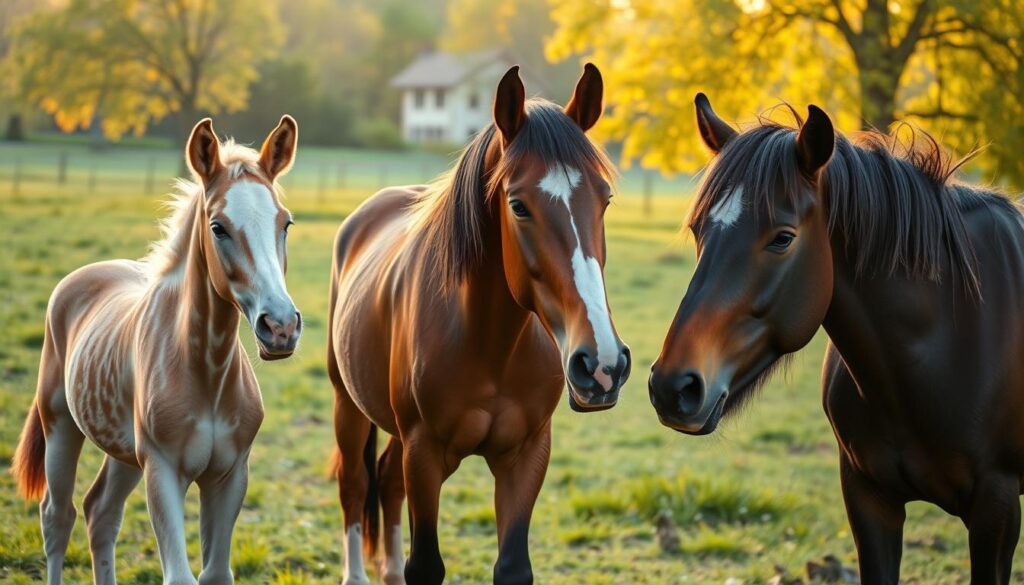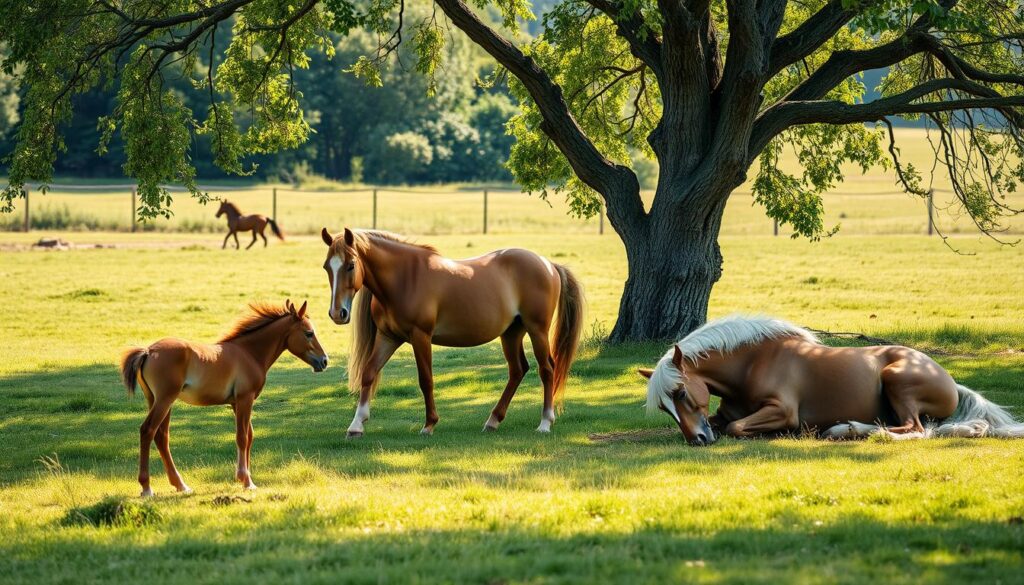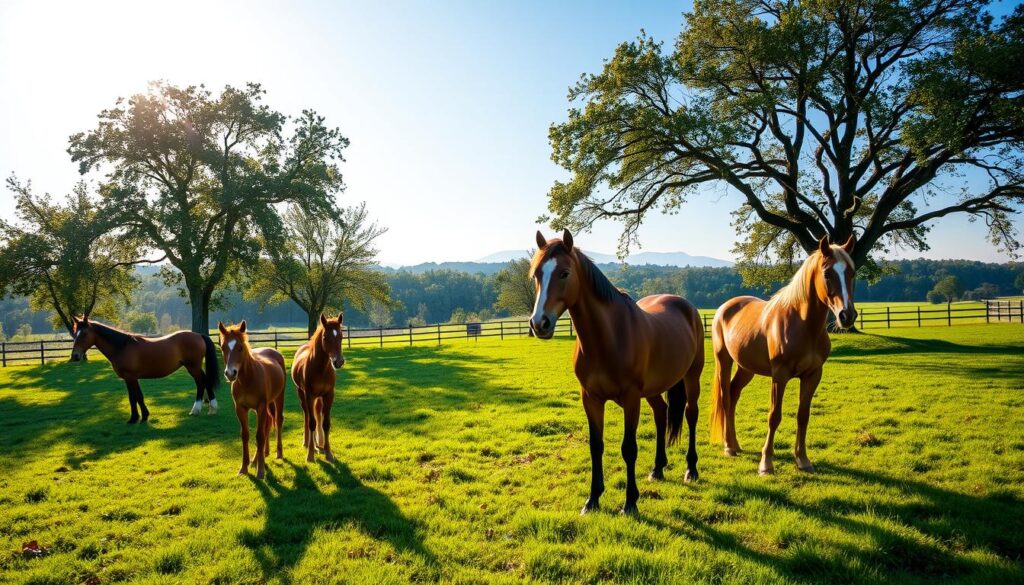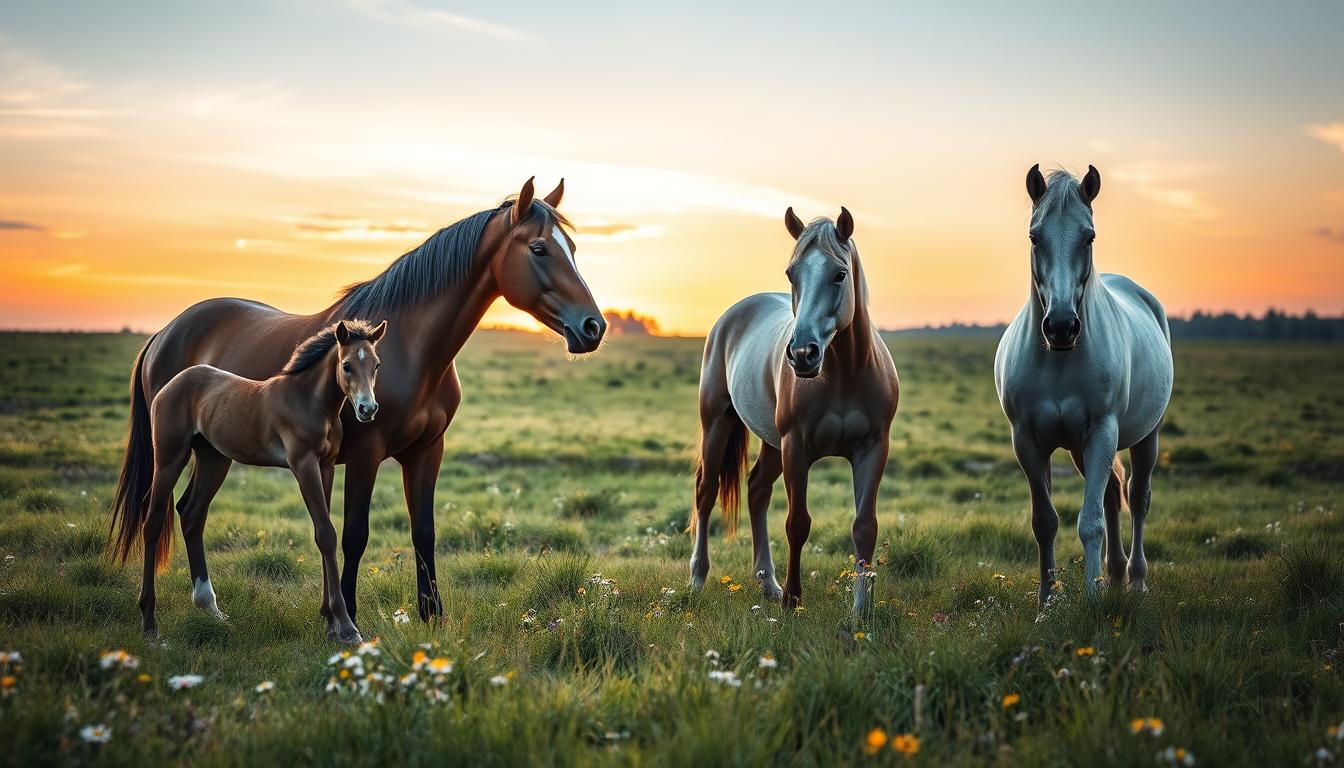Knowing about horse age and lifespan is key for any horse lover or owner. The life expectancy of a horse changes based on breed, living conditions, and care. Understanding what to expect at each stage of a horse’s life helps owners give their best care.
Horse lifespans are shaped by genetics and environment. Learning about horse life expectancy helps owners support healthy aging and extend their horses’ lives. This article will explore horse lifespans, including average age, factors that affect lifespan, and caring for aging horses.
Key Takeaways
- Understanding horse age and lifespan facts is essential for horse owners and enthusiasts.
- Horse life expectancy varies depending on factors such as breed and living conditions.
- Average horse age is influenced by a combination of genetic and environmental factors.
- Knowing what to expect at different stages of a horse’s life can help owners provide the best possible care.
- Proper care and management can promote healthy aging and extend the life of horses.
- Horse lifespans are an important consideration for owners who want to ensure the well-being of their animals.
Understanding Basic Horse Life Expectancy
Horse life expectancy is influenced by many factors. These include breed, living conditions, and care. The average age of a horse can be between 25 to 30 years. It’s important to look at both wild and domestic horses to understand how domestication affects their lifespan.
Domestic horses usually live longer than wild ones. This is because they get better care from their owners. They get regular vet visits, proper food, and a safe place to live. Domestic horses can live for 28-32 years, while wild ones live for 20-25 years.
Wild vs. Domestic Horse Lifespans
The care and management a horse gets greatly affects its lifespan. Domestic horses get regular vaccinations and dental care. They are also protected from harsh weather. Wild horses, on the other hand, have to find their own food and water. They face predators and extreme weather.
Average Lifespan Statistics
Studies show that a domestic horse’s average lifespan is about 30 years. Some breeds, like the Arabian and Quarter Horse, can live up to 35-40 years. Knowing these statistics helps owners care for their horses as they age.
Record-Breaking Horse Ages
While most horses live to be 30 years old, some can live into their 40s and 50s. Old Billy, for example, lived to be 62 years old. Such cases are rare but show that with proper care, horses can live long, healthy lives.
Understanding what affects a horse’s lifespan helps owners ensure their horses live long, healthy lives. This includes regular vet visits, proper food, and a safe place to live. Even though horses age naturally, with the right care, they can thrive into their 30s and beyond.
The Natural Aging Process in Horses
The horse aging process is complex and affects many parts of a horse’s life. As horses get older, they go through big physical changes. These changes can impact their health and happiness. It’s important for owners to understand these changes to care for their horses well.
Some key aspects of the horse aging process include:
- Physical changes, such as weight loss, muscle atrophy, and decreased mobility
- Mental maturity, which can affect a horse’s behavior and trainability
- Biological changes, such as decreased immune function and increased risk of age-related diseases
Research shows that the horse aging process can be influenced by genetics, nutrition, and lifestyle. For example, a study found that horses that exercise regularly and eat well live longer and healthier.
By understanding the natural horse aging process, owners can help their horses age healthily. This includes regular vet visits, a balanced diet, and exercise. It also means watching for signs of aging-related health problems.
The key to promoting healthy aging in horses is to focus on prevention and early intervention, rather than simply treating age-related health issues as they arise.
By being proactive and informed about the horse aging process, owners can help their horses live longer, healthier, and happier lives.
Key Horse Age and Lifespan Facts
Knowing the different stages of a horse’s life is key to giving them the best care. The average horse life expectancy is 25 to 30 years. But, with the right care, some horses can live up to 40 years. It’s important to think about breed, size, and living conditions when figuring out how long do horses live.
A horse’s life is split into several stages, like foalhood, adolescence, and adulthood. Each stage has its own challenges and needs. For example, foals need lots of vet visits and a good diet to grow fast and strong.
As horses get older, they change physically and mentally. They become physically mature between 4 to 5 years. But, mentally, they take longer, usually around 6 to 7 years. Knowing these changes helps in training and caring for horses, which affects their horse life expectancy. By understanding a horse’s life stages and how long do horses live, owners can give them a long, healthy life.
Physical Development Stages
- Foalhood (0-1 year): Rapid growth and development
- Adolescence (1-4 years): Continued growth and development
- Adulthood (4-20 years): Physical maturity and peak performance
Mental Maturity Timeline
Horses usually reach mental maturity between 6 to 7 years. But, this can change based on breed, training, and temperament.
Determining Your Horse’s Age
To figure out a horse’s age, you can use dental checks and look at other physical signs. Knowing the factors affecting horse lifespan helps guess a horse’s age right. A vet can tell a horse’s age by looking at its teeth. They check the wear and any special dental features.
Other signs, like the state of the horse’s joints, muscles, and coat, also hint at its age. Older horses might show wear on their joints. Younger ones have a brighter, shinier coat. Looking at these factors affecting horse lifespan helps owners understand their horse’s age better. This way, they can give the right care.
- Dental condition and wear
- Joint health and mobility
- Muscle tone and condition
- Coat condition and shine
By checking these signs and thinking about the factors affecting horse lifespan, owners can guess their horse’s age well. This helps them care for their horse the best way possible.
Factors Affecting Horse Longevity
Horse longevity depends on many things. These include genetics, environment, nutrition, and exercise. Knowing these factors helps horse owners care for their horses better. This knowledge is key to a horse’s health and lifespan.
Several key factors contribute to horse longevity, including:
- Genetic influences, which can predispose horses to certain health conditions
- Environmental impact, such as living conditions and exposure to diseases
- Nutrition and diet, which play a critical role in maintaining overall health
- Exercise and activity levels, which can affect physical and mental well-being
Managing these factors helps horse owners ensure their horses live long, healthy lives. Regular vet visits, a balanced diet, and enough exercise are important. These actions can greatly improve a horse’s health and happiness.
Horse owners need to know what affects their horse’s lifespan. Taking steps to reduce negative impacts is crucial. This way, they can help their horse live a long, happy life. Making informed care decisions is essential for promoting longevity.
Common Age-Related Health Issues
As horses age, they face more health problems. The aging of horses process can lead to various conditions. These issues can greatly affect their quality of life.
Some common health issues in aging horses include:
- Arthritis: a condition that affects the joints, causing pain and stiffness
- Dental problems: tooth loss, gum disease, and other issues that can make eating and digesting food difficult
- Respiratory problems: conditions such as chronic obstructive pulmonary disease (COPD) that can make breathing difficult
It’s important to understand these health issues to care for aging horses properly. Recognizing the signs of these conditions helps owners improve their horse’s life. This ensures they get the best care during the horse aging process.

Breed-Specific Lifespan Variations
Horse life expectancy varies a lot by breed. Some breeds live longer, while others have shorter lives. This is due to genetics, health issues, and how they are bred.
Knowing about breed-specific lifespans is key for horse owners and fans. Horse longevity depends on genetics and environment. Some breeds face more health problems as they age.
Short-Lived Breeds
Breeds like the Akhal-Teke and the Arabian live shorter lives. They usually live for 20-25 years. These horses might get sick more often, especially with breathing and joint problems.
Long-Lived Breeds
But, some breeds like the Appaloosa and the Quarter Horse live longer. They can live up to 30-35 years or more. These horses are often stronger and face fewer health issues as they age.
In summary, it’s important to consider breed-specific lifespans when owning or loving horses. Knowing what affects their life expectancy helps us care for them better.
Proper Care for Aging Horses
When we talk about how long horses live, we must focus on their care. Older horses need special care to stay healthy and happy. This includes the right food, exercise, and health checks.
Here are some important care tips for aging horses:
- Give them a balanced diet that fits their health needs, including dental care
- Adjust their exercise to protect their joints and muscles
- Check their health often to catch problems early
Knowing what affects a horse’s lifespan helps us care for them better. A holistic approach to their care is key. This means looking at their individual needs and health. Regular vet visits and a careful plan can greatly improve their life.
By focusing on the care of aging horses, we can help them enjoy their later years. Whether you’re new or experienced in horse care, it’s crucial to provide the best for your aging horse. This ensures they live a fulfilling life, which is our goal when thinking about how long horses live.
Signs of Healthy Aging in Horses
As horses age, it’s key to spot signs of healthy aging. This ensures they get the care they need. A well-cared-for horse can live a long, healthy life, sometimes into their 30s. Knowing the physical, behavioral, and activity changes is vital for horse owners.
Some important signs of healthy aging in horses are:
- Physical signs, like a shiny coat, good body condition, and minimal joint wear
- Behavioral changes, such as being more relaxed and open to new things
- Activity level changes, like less intense exercise and more gentle activities
By noticing these signs, horse owners can help their horses stay healthy. Regular vet visits, a balanced diet, and enough exercise and mental stimulation are key. These steps help promote horse longevity and a healthy horse aging process.

With the right care, horses can live long, happy lives. And their owners get to enjoy many years with their equine friends.
Modern Veterinary Advances in Horse Longevity
Recent equine aging research has brought big changes to horse care. These changes help horses live longer and healthier lives. New technologies and treatments manage age-related health issues, making horses more comfortable.
Modern veterinary care for horses focuses on several key areas:
- Personalized nutrition and diet plans tailored to individual horses’ needs
- Advanced diagnostic techniques, such as genetic testing and imaging technologies
- Targeted therapies and treatments for specific health conditions, including regenerative medicine and stem cell therapy
These advances in equine aging research and veterinary care have greatly improved our understanding of horse longevity. By keeping up with the latest developments and working with veterinarians, horse owners can give their horses the best care. This helps horses live long, happy, and healthy lives.
Quality of Life Considerations for Senior Horses
As horses get older, their quality of life is very important. The horse aging process is influenced by many things. These include what they eat, their health, and how they interact with others. Knowing these factors is key to giving senior horses the best care.
Here are some important things to consider for a good life for senior horses:
- Pain management: Giving them enough pain relief to be comfortable.
- Social interaction: Making sure they have friends, whether horses or humans, to avoid loneliness.
- Mental stimulation: Keeping them active and engaged with activities like training or play.
By focusing on these areas, horse owners can help their senior horses live well. Proper care and attention can greatly improve their life. It’s vital to understand the horse aging process and what affects their lifespan to care for them well.
By putting quality of life first, horse owners can help their senior horses have happy, healthy lives. It’s important to think about the horse aging process and what affects their lifespan when making care decisions.
Retirement and End-of-Life Planning
Thinking about horse life expectancy and how long horses live is key. We must plan for their retirement and end-of-life. This involves making tough choices, but it’s vital for their well-being and dignity.
When planning for a horse’s retirement, age, health, and quality of life matter. Retirement facilities offer a safe, comfortable place for horses to spend their golden years. They provide specialized care, including palliative care and euthanasia, for a peaceful end.
Some important things to consider in retirement and end-of-life planning are:
- Assessing the horse’s overall health and well-being
- Evaluating their quality of life and potential for future suffering
- Exploring options for retirement facilities and end-of-life care
- Discussing euthanasia and palliative care with a veterinarian
Knowing horse life expectancy helps owners make better care decisions. By planning ahead, we can ensure our horses get the best care and a dignified end.

“The goal of end-of-life planning is to prioritize the horse’s comfort, dignity, and well-being, and to make decisions that align with their best interests.”
Looking Ahead: Advances in Equine Age Management
The study of equine aging research is growing fast. This means better chances for horse longevity. New discoveries in vet science, nutrition, and care are helping horses live longer and healthier.
Research into aging’s genetic and molecular roots is crucial. It could lead to new ways to slow aging in horses. Stem cell treatments, for example, might help reverse age-related issues and boost energy in older horses.
Also, special diets and supplements are being made for aging horses. These can help fight off age-related diseases and keep them healthy. With these advances and better care, the future for aging horses looks very promising.
Looking to the future, the work of researchers, vets, and horse owners will bring more breakthroughs. The chance to make horses live longer and better lives is very exciting.
FAQ
Q: What is the average lifespan of a horse?
A: Horses usually live between 25 to 30 years. Some can even reach their 30s or 40s. Their lifespan depends on breed, living conditions, and health.
Q: How do wild horses and domestic horses differ in their lifespans?
A: Wild horses live shorter lives than domestic ones. Wild horses live 20 to 25 years. Domestic horses can live up to 30 years or more. Domestic horses get better care and live in a safer environment.
Q: What are some of the record-breaking ages of horses?
A: The oldest recorded horse was Old Billy, a Welsh gelding, who lived to 62. Vieja Luna, a Mongolian mare, lived to 56. Bucephalus, a Thoroughbred, lived to 35.
Q: How does the aging process in horses occur?
A: As horses age, they lose muscle and flexibility. Their immune system weakens and their minds change. They also face health issues like arthritis and dental problems.
Q: What are the key stages of physical development and mental maturity in horses?
A: Horses reach physical maturity at 4-5 years. Mental maturity takes longer, until 7-8 years. Early years are critical for their growth and behavior.
Q: How can I determine the age of my horse?
A: A vet can check a horse’s teeth to guess its age. A horse’s looks, like its coat and hooves, can also hint at its age.
Q: What are the key factors that affect a horse’s lifespan?
A: Genetics, environment, diet, and exercise all play a role. Proper care and disease prevention help horses live longer. Some breeds may live longer than others.
Q: What are some common age-related health issues in horses?
A: Horses face issues like arthritis, dental problems, and Cushing’s disease as they age. Managing these health concerns is key for senior horses.
Q: How can I provide proper care for my aging horse?
A: Adjust their diet and exercise. Monitor their health and comfort closely. Regular vet visits and preventive care are crucial for senior horses.
Q: What are some signs of healthy aging in horses?
A: Healthy aging signs include a shiny coat and good energy. They should also show natural behaviors. Some physical changes are okay, but they should still have a good quality of life.
Q: How do modern veterinary advances impact horse longevity?
A: New vet tools and care strategies help horses live longer and better. Ongoing research and innovations in equine healthcare support older horses’ well-being.
Q: What considerations should be made for the quality of life of senior horses?
A: Focus on their comfort and mental stimulation. Ensure their environment is safe and comfortable. Regularly check and adjust their care plan to maintain their quality of life.
Q: What options are available for the retirement and end-of-life planning of horses?
A: Consider retirement facilities and palliative care. Making the decision to euthanize is hard but necessary when their quality of life declines. Always think of the horse’s best interests.

